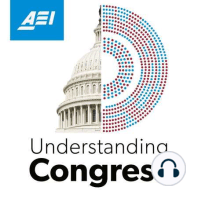29 min listen

What Is the Congressional Debt Limit? (with Phil Wallach)
What Is the Congressional Debt Limit? (with Phil Wallach)
ratings:
Length:
22 minutes
Released:
Mar 6, 2023
Format:
Podcast episode
Description
The topic of this episode is: "What is the congressional debt limit?"To answer that question we are once again speaking with Philip Wallach. He was the very first guest on this podcast, where we pondered why we need a Congress. Phil is a senior fellow at the American Enterprise Institute, and the author of the book, Why Congress, which was published by Oxford University Press in 2023. Phil also has written previously about the debt limit, which makes him the right person to ask: What is the congressional debt limit?Kevin Kosar:Welcome to Understanding Congress, a podcast about the first branch of government. Congress is a notoriously complex institution, and few Americans think well of it, but Congress is essential to our republic. It's a place where our pluralistic society is supposed to work out its differences and come to agreement about what our laws should be, and that is why we are here to discuss our national legislature and to think about ways to upgrade it so it can better serve our nation. I'm your host, Kevin Kosar, and I'm a resident scholar at the American Enterprise Institute, a think tank in Washington, DC.Phil, welcome back to the program.Phil Wallach:Thanks for having me back.Kevin Kosar:Let's start by getting clear on what we're talking about. There are deficits and there is debt. How do these two things differ?Phil Wallach:It's a stocks versus flow kind of thing. Each year, we have spending and revenue—in almost all years in recent memory, we have more spending than revenue. That creates a deficit. So the accumulation of all of the past deficits is the debt. So the debt is our total of all the spending we've done minus the revenue we've taken in, and it is now officially north of $30 trillion.Kevin Kosar:So when the Treasury needs to issue more debt, it's got to sell bonds—basically, these IOUs that say, "Please give us money that we can spend now, and we'll pay you back later." Is that essentially what's happening when we're taking on more debt?Phil Wallach:Yeah. A bond is a legally obligating instrument, and debt put out by the United States government is considered the lowest-risk kind of debt instrument in the world. So the government is not just saying, "If we feel in a good mood, we'll pay you back,” but, “we are legally obligated to pay you back with interest." That's very valuable to investors. And of course, United States bonds form the gold standard of collateral used not only in this country but around the world in the global financial system.Kevin Kosar:So this leads us to an important point, which is that an executive agency called the US Treasury that is issuing debt, but it doesn't do it simply at the behest of the President. The President can't say, "Well, let's just issue as much debt as we want on this day of the week or during this year." We have a law that limits the amount of debt; that is, our legislature has a role here.We keep finding ourselves—with some frequency—in a situation where Congress will run these yearly deficits where they're spending more than the revenue coming in, and the debt grows and grows. Then, when we hit this legally mandated limit, Congress has to vote to pass a new law so that the limit is set higher so that more debt can be issued.So let's just turn back the clock. This practice of setting a debt limit by law: why do we have it, and when did Congress first start doing it?Phil Wallach:Okay, so go back to the...
Released:
Mar 6, 2023
Format:
Podcast episode
Titles in the series (45)
Can Congress budget? (with Allen Schick) by Understanding Congress